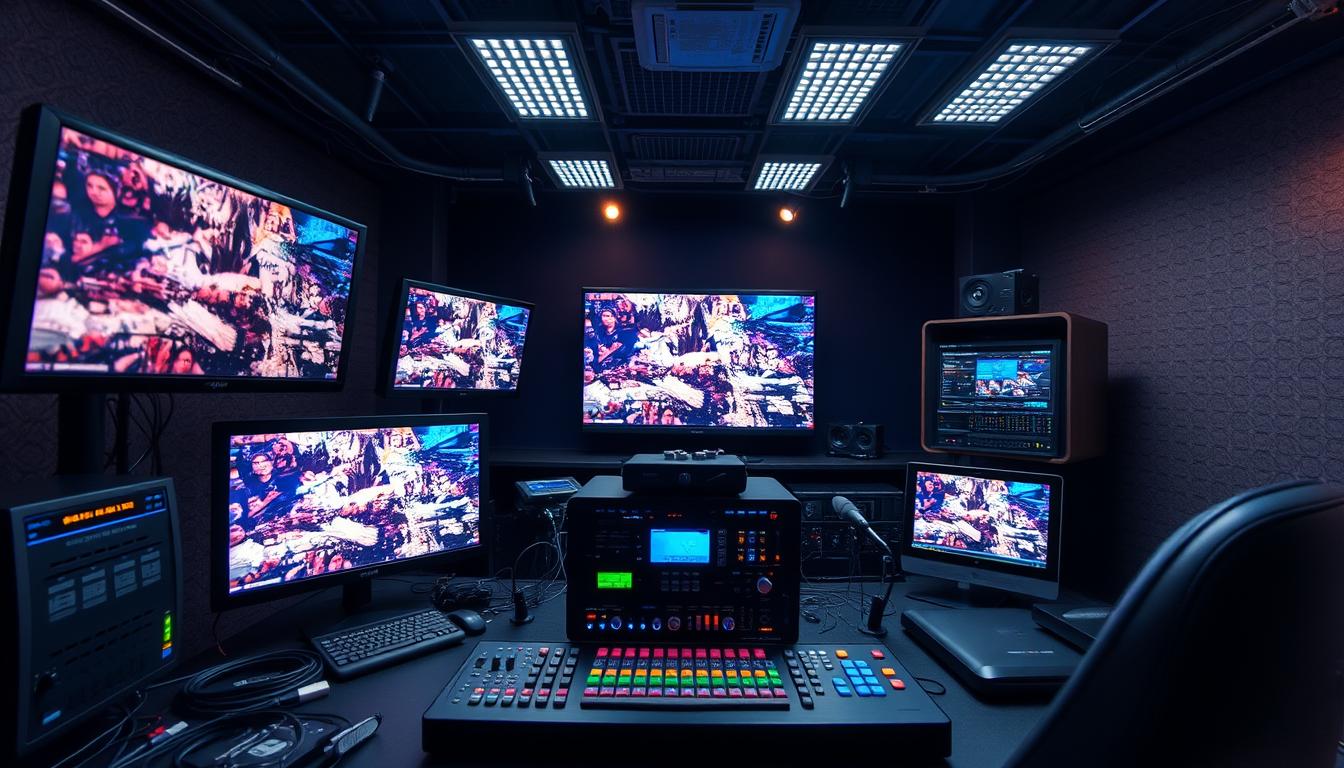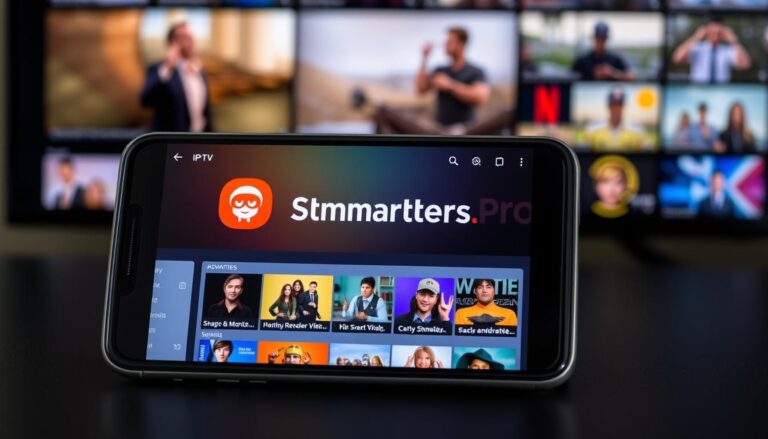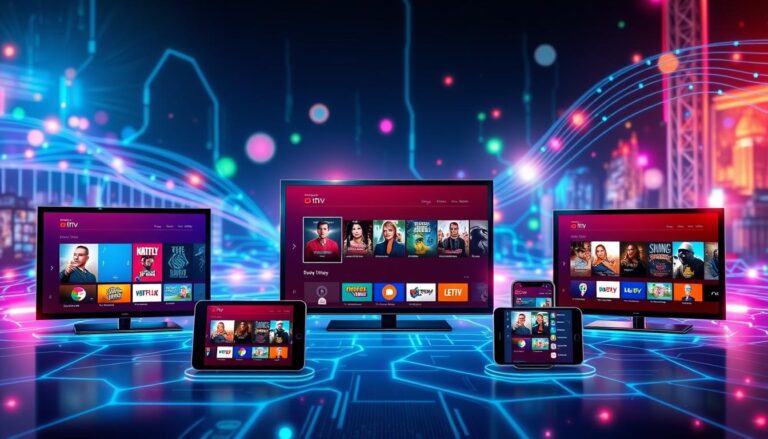IPTV Encoder: Streamline Your Video Broadcasting
In the fast-paced world of video content, IPTV-encoders are key. They change how we send video online. These devices turn video into digital form for easy internet streaming.
IPTV-encoders are essential for broadcasting video today. They make sure your content gets to more people smoothly. They also keep your video clear and intact, no matter where it’s seen.
Key Takeaways
- IPTV-encoders convert video content into a digital format for seamless internet-based delivery
- These devices play a crucial role in maintaining professional video quality and improving content reach
- IPTV-encoders enable organizations to share their messages, events, and educational content with ease
- Streamline your video broadcasting workflow with the power of IPTV-encoders
- Discover how IPTV-encoders can optimize your content delivery and expand your audience
What is an IPTV Encoder?
An IPTV-encoder is a key tool in video streaming and broadcasting. It changes raw video into a digital format for internet streaming. This lets viewers enjoy high-quality video online.
The main job of an IPTV-encoder is to make a digital version of the video. This version can be streamed live on different platforms.
Encoding Video Content for Seamless Streaming
IPTV-encoders work in real-time for live streaming. They ensure video and audio quality is high and latency is low. This makes for a smooth viewing experience.
They use codecs like H.264 and H.265 to compress video data. This reduces file size without losing quality.
Some key features of IPTV-ncoders include:
- Support for multiple video coding options, including H.264 and H.265
- Compatibility with a range of audio coding formats, such as AAC, AC3, MP2, and MP3
- Encoding capabilities up to 1080p (1920×1080) @60Hz video resolution
- Maximum encoding rates up to 40Mbps for mainstream code and up to 8Mbps for sub-stream code
- Flexible encoding modes, including Constant Bitrate (CBR) and Variable Bitrate (VBR)
- Video display settings like rotation, mirroring, and flipping
- Web browser-based GUI control for encoding, audio, OSD, and system settings
- Diverse connectivity options, including HDMI input and output, RJ45 networking, RS-232, audio output, and microphone input
With IPTV encoders, content creators can deliver high-quality video to viewers. This ensures a seamless streaming experience that engages the audience.
| IPTV Encoder Model | Key Features |
|---|---|
| QIP-YPB 2 IPTV-Encoder | Dual-channel encoders for creating MPEG-2 or H.264 IPTV streams from two separate video sources |
| QIP-HDMI 2 IPTV-Encoder | Two HDMI inputs, setting a new standard for sports, motion, and digital signage encoding |
| QMOD-SDI 2 IPTV-Encoder | Two SDI inputs for high-quality video distribution in sports venues and broadcast facilities |
| QMOD-HDMI 4K UHD Modulator-IPTV-Encoder | Designed to distribute UHD or HD video content over CATV systems to an unlimited number of televisions or standalone HDTV Tuners |
| QMOD-SDI 1.5 HDTV Modulator-IPTV-Encoder | Accepts 3G SDI and 60/30 Hz feeds from prosumer SDI sources, expanding its capabilities beyond standard SDI resolutions |
| QMOD-HDMI 1.5 HDTV Modulator-IPTV-Encoder | Maintains the QMOD track record for quality and innovation, showing a continuous improvement in features and performance |
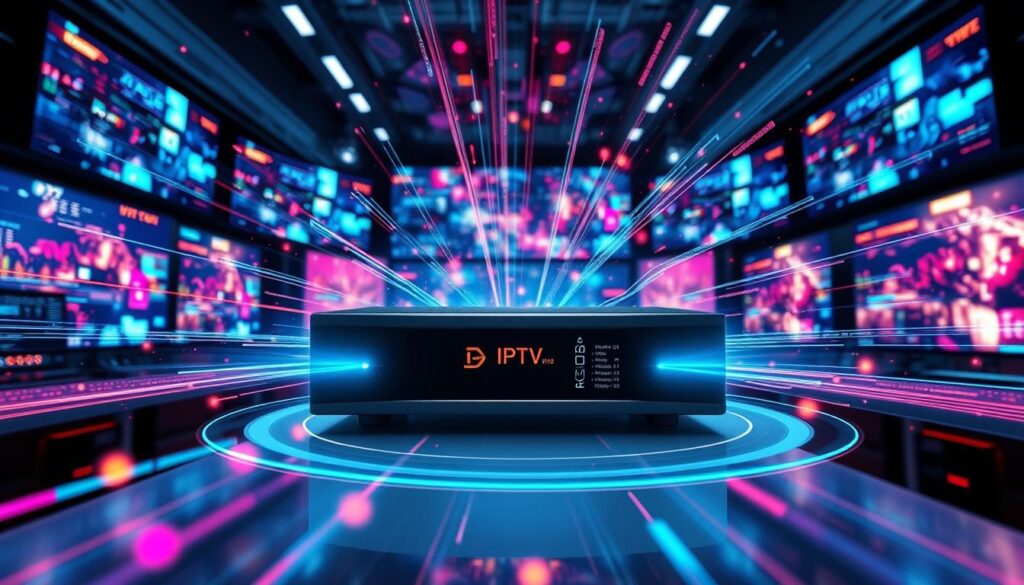
“IPTV-encoders play a vital role in maintaining high-quality video and audio for seamless streaming experiences.”
Unleashing the Power of Hardware IPTV Encoders
Hardware IPTV-encoders are a top pick for pros in the broadcasting world. They are built just for encoding, giving better performance and quality than software encoders. This is because software encoders share resources with the operating system.
Key Features of Hardware IPTV Encoders
Hardware IPTV-encoders come with features perfect for big video broadcasting needs. These include:
- High-definition video support for delivering crisp, clear video quality
- Multi-channel encoding capabilities, allowing for the simultaneous encoding of multiple video streams
- Low latency, ensuring seamless and synchronized video delivery
- Versatile connectivity options, including support for a variety of input and output formats
These IPTV-encoders are made for top-notch encoding performance. They meet the needs of businesses needing reliable and high-quality video quality for their enterprise applications.
“Ateme powers half of all ATSC 3.0 deployments across North America, offering solutions to manage secure transmission across video distribution platforms from satellite to IP.”
With their special hardware and dedicated encoding, these encoders offer unmatched performance and reliability. They are the go-to for critical video broadcasting needs.
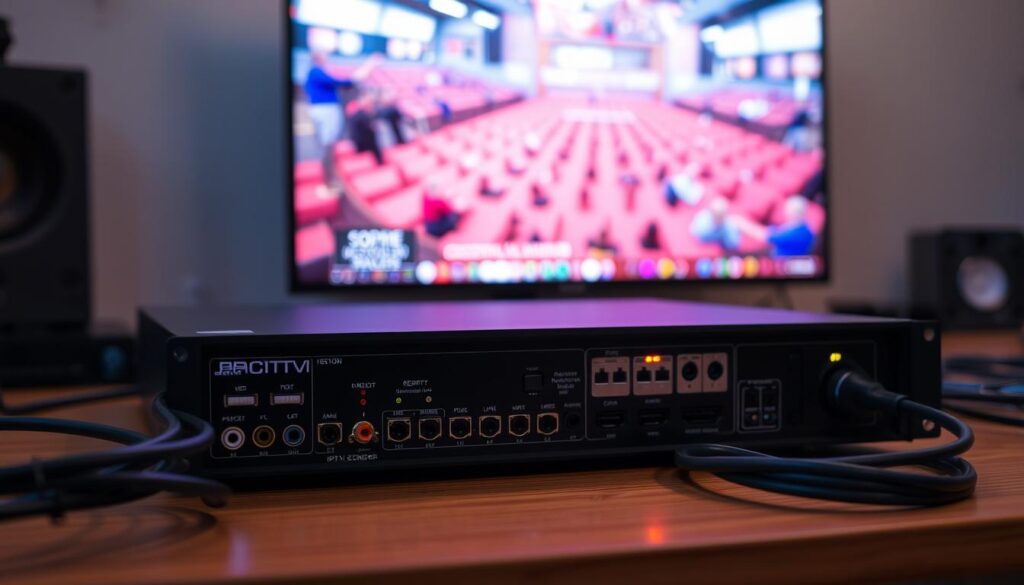
iptv encoder: Versatile Software Solutions
Software-based IPTV-encoders are more affordable and easy to use. They run on your computer, making them flexible. These tools can stream live content to places like YouTube and Facebook.
While they might not be as powerful as hardware encoders, they still offer great video and audio quality. This makes them a good choice for those on a budget or with simpler streaming needs. Some popular software options include:
- OBS Studio: A free, open-source encoder for live streaming.
- Vidblaster X: Offers different prices, from $9 to $999 per year.
- Wirecast: Has two packages, starting at $35 and $46 per month.
- Wowza: Provides various pricing, including a one-time $149 option.
- Streamlab OBS: Costs $149 per year or $19 monthly for extra features.
These software encoders are a budget-friendly and easy-to-use option for live streaming. They don’t require dedicated hardware.
“IPTV-encoder software offers a cost-effective and user-friendly alternative for live streaming, making it an attractive choice for budding broadcasters and content creators.”
Choosing the Right IPTV Encoder
When picking an IPTV-encoder, think about what you need to stream, your budget, and what features matter most. Hardware encoders give top-notch performance and advanced features but cost more. They’re best for pros or big businesses. Software encoders are cheaper and easier to use, great for newbies to mid-level streamers.
Considerations for Selecting an IPTV Encoder
When choosing an IPTV-encoder, consider these key points:
- Video and Audio Quality: Check if the encoder can make high-quality video and audio. This ensures your viewers have a great watching experience.
- Encoding Capabilities: Look at the encoder’s support for different video and audio formats. Also, see if it can handle various resolutions and frame rates to meet your streaming needs.
- Compatibility with Streaming Platforms: Make sure the IPTV-encoder works well with your chosen streaming sites like YouTube, Twitch, or Facebook Live.
- Ease of Use: Think about the encoder’s user interface and setup process. This is important if you’re not tech-savvy.
- Budget: Know your budget and compare different IPTV-encoders. Find the one that offers the best value for your money.
| Product | Dimensions | Weight | Video Quality | Audio Formats | Connectivity |
|---|---|---|---|---|---|
| URayCoder | 6.1 x 6.02 x 2.05 inches | 12.6 ounces | Supports 4K video quality | AAC, AAC+, AAC++ | RTMP, SRT, HLS |
| J-Tech Digital | 6.12 x 3.93 x 1.25 inches | 1.25 pounds | Streams to 4 platforms simultaneously | Supports dual encoding, NDI HX2 protocol | Connectivity can be temperamental |
| Iseevy | 4.17 x 7.44 x 1.73 inches | 1.57 pounds | Supports 1080P and 4K inputs | H.265/H.264, AAC/MP3 | User interface could be more intuitive |
| DDMALL | 2.6 x 0.8 x 0.5 inches | 0.882 ounces | Ultra-compact, simple plug-and-play, USB-powered | Requires technical know-how | Lacks direct social media integration |
By carefully thinking about these factors, you can pick an IPTV-encoder that fits your needs, budget, and preferences. This ensures a smooth and engaging video streaming experience.
Conclusion
IPTV-encoders are key in making video broadcasting smooth. They help deliver content without hitches and make watching videos better. You can pick from hardware or software encoders, depending on what you need.
Choosing the right IPTV-encoder is crucial. It helps you make and share videos more efficiently. You can improve the quality of your videos and reach more people.
When picking an IPTV-encoder, think about what you need and what you have. There are many options, from top-quality hardware to flexible software. This variety meets different broadcasting needs.
The world of IPTV is always changing. Keeping up with new IPTV encoder tech is important. This way, you can keep offering a great viewing experience to your audience.

